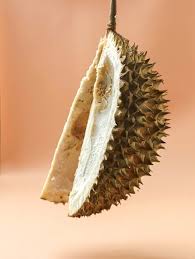A Biodegradable Packaging Composition

The project offers a significant competitive advantage by utilising durian skin waste, a readily available and underused by-product from Malaysia’s agricultural sector. By converting this abundant local waste material into a value-added resource, the innovation supports sustainable waste management, reduces environmental impact, and lowers raw material costs. This eco-friendly approach aligns with circular economy principles and provides a cost-effective, locally sourced alternative to imported or synthetic ingredients, giving it a unique position in both the domestic and international markets.
Plastics are petroleum-based polymers and they are non-renewable resources. They are neither fully biodegradable nor environmental friendly and unaffected from microbial attack. They take very long time to decompose and the continuous usage of these plastics lead to a serious problem with long life of plastic waste. It is a global challenge as it takes millions of years for fossil fuels to be replenished. Therefore, the volume of plastic waste increases year by year either on the landfill or in the ocean. In order to reduce the environmental problems, a ‘green’ material for food packaging was developed to avoid further destruction of the environment. Commodity of synthetic polymer can be replaced with non-petroleum resources which is a biopolymer due to its biodegradable nature such as PLA.
The project worked on the development of fully ‘green’ biodegradable food packaging container from durian skin fibre (DSF) reinforced polylactic acid (PLA) and epoxidized palm oil (EPO) as a plasticizer. The DSF was obtained from biomass, then incorporated into PLA to produce biocomposite as it maintains the truly green characteristics and reduces the cost of PLA. This research also investigated the properties of neat PLA, PLA/DSF and PLA/DSF/EPO biocomposites and the impact of the PLA/DSF biocomposite process on the environment of this food packaging container from raw materials to the disposal method.
This project introduces a biodegradable food packaging container made from a mix of durian skin fibre (DSF), polylactic acid (PLA), and epoxidised palm oil (EPO). Unlike traditional plastic packaging, which is made from non-degradable petroleum-based materials, this packaging breaks down naturally in the environment losing about 83% of its weight in just 90 days during a soil test. The durian skin, an agricultural waste, helps reduce the cost of using PLA and keeps the product eco-friendly. Adding palm oil improves the flexibility of the packaging. Overall, the project offers a green, cost-effective alternative to plastic using local, renewable resources, while also reducing environmental impact and plastic waste.


